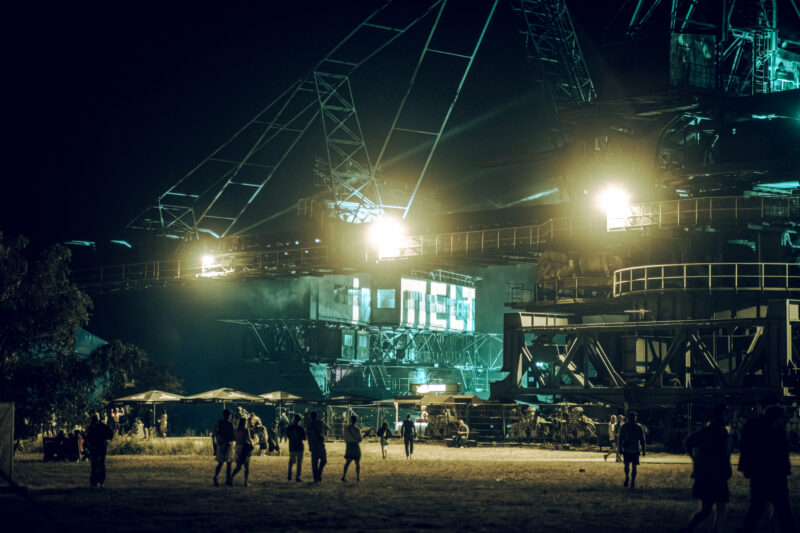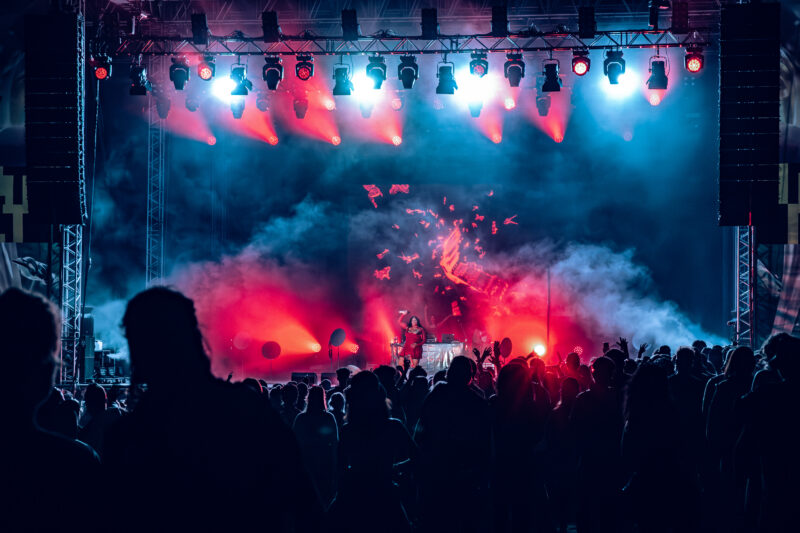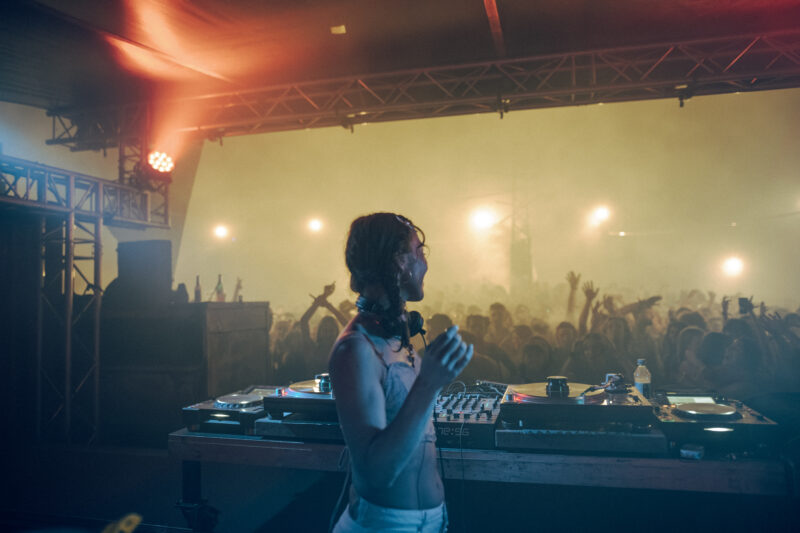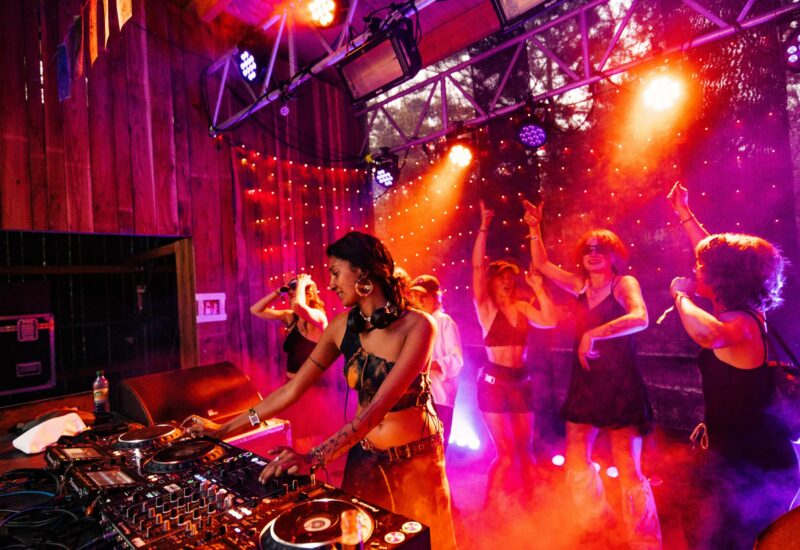I came to MELT with little to no expectations other than a fun weekend of dancing, floating around the stages and soaking up some sun by the lake. And that is exactly what I got, a diverse range of house and techno acts with some dips into other genres that challenged my small catalog of dance moves and entertained my interest in which acts gave the most energy, topped off by a little sunburn. While some connoisseurs of the most underground music scenes absolutely hate festivals for commercializing niche music styles, I have to admit that I enjoy the festival vibe. I understand that short 45-minute sets, competing stages and a crowd with short attention spans will never create the same arc of suspense as a club night. But spending a weekend sleeping or barely sleeping in a tent, breathing more dust than air, and drinking warm cans of beer somehow takes you further out of your everyday life. And for many people, festivals can be the place where they are first introduced to music and artists that will later draw them into the real thing, it has certainly happened to me before.
New Challenges
Last year we read many reports on how festivals were struggling in the aftermath of the pandemic. Many artists had to cancel at the last minute, booking acts from overseas was too risky, staff shortages at airports mixed with a still reluctant audience. Things have to be better this year, right? Germany has a huge range of festivals, with more than ten major ones hosting well over 40,000 people and hundreds of smaller festivals. While ticket prices are generally on the rise, attendance is falling. Some organizers have already called it quits due to a lack of sales and unforeseeable costs. According to a survey by LiveKomm, the German association of live music venues, 33% of all festivals surveyed consider their 2024 festival to be at risk.
Beke Trojan, head of music booking at the indie pop and electro festival MS Dockville mentioned the challenge of appealing to a younger audience that has missed out on the energy of a festival due to the pandemic: “We have noticed that since last year it has become more difficult to reach them [the young audience]. Because these are the people who may have had their first festival or even concert experience last year. So we realize that, in addition to the programme, we first have to educate on that feeling and the experience of a festival.“
But the struggles of festivals and the changing festival landscape certainly have more than one cause. Production and staffing costs are skyrocketing and unpredictable, fees are rising, especially for international acts, and resources are scarce. With the general cost of living on the rise, passing this on to audiences by increasing ticket prices is not a sustainable option when ticket sales are already falling. On top of that, we are in a gold rush atmosphere, with a widespread mindset that after the pandemic everyone wants to go wild. Organizers of new festivals are counting on this, as are many artists who finally want to tour their covid albums. As a result, we have an overwhelming number of events eating into each other’s exclusivity. Last year this was compensated by government funding, but what happens now that these support programmes are coming to an end?
Timo Kupf, head of Maifeld Derby, is particularly worried about smaller and independent festivals: “I said last year that this year will be much more difficult. This year I’m saying that next year will be even more difficult. How do we ever get back to normal, even if Corona is no longer a factor, but costs have gone from 30% to over 100% in some cases? I still see that as the real and only insurmountable challenge.” The competition is up, not just because new festivals are trying to get their share of the pie, but because a lot of festivals seem to be chasing the same headliners in the hope that they will attract the crowds they need to break even. But playing it safe, booking the most palatable artists for a broad audience, ends up in a pool of festivals with similar line-ups, making you think some DJs exist twice. It’s a Catch 22.

Photo by Alicia Creupelant
Artists at the Tail End
The festival, which used to feature big mainstream acts such as Florence and the Machine and Oasis, is clearly taking a different approach with Florian Czok taking over the lead of the festival two years ago. MELT deliberately decided to remove all headliners from their posters. They now present their well-curated line-up in a simple alphabetical order. The main stage has been replaced by a series of smaller nooks and DJ booths. This approach resonated with many festival-goers, resulting in an atmosphere of good cheer and plenty for everyone to discover. Compared to last year, ticket sales have increased. But the numbers are not what they were before the pandemic. More importantly, the festival is not reaching its full capacity. While I enjoyed the fact that you never had to stand in long lines for the bathroom and there was plenty of space to dance, it was noticeable that MELT hadn’t managed to sell out. Some floors were unfortunately empty and even the bigger stages were never overly packed. With names like FKA Twigs and Slow Thai canceling, this year’s lineup seemed even more lacking in crowd pullers.

Shygirl by Alicia Creupelandt
Eschewing the big names is one way to save money. Another is to focus on DJs rather than bands, which means fewer people to pay and easier production. Festivals have never been known for paying particularly high fees to the artists at the bottom of the line-up anyway. But with travel and staff costs on the rise, many artists are finding it increasingly difficult to make ends meet when performing on festival stages. In a way, festivals are the Spotify of the live sector: Big acts get big bucks, while smaller artists, newcomers and musicians in more experimental genres have to hope that their performance will be the career kickstart they were promised. Otherwise, it is mere, old exposure.
“Festivals can be a useful stepping stone for artists who are just starting to tour. Newcomers who take the risk and lose money on live gigs will sometimes do the same at festivals to get to the next step in their career. I know in a perfect world it wouldn’t be like that. But I don’t really know how to change it either. Fair pay is a point where a systematic change is needed – where everyone has to sit around the same table, agencies, festivals, producers and so on. The structure of the festival and the music market is just very entrenched”, Flo told me in all honesty. Beke also thinks that fair fees are a big issue that would be worth getting all the festival players around the table for: “What are fair fees for small newcomer artists? That we agree on a certain minimum wage or even discuss what is fair. What are the costs for artists? Both with newcomers and at the higher end, it would be a great opportunity to discuss how the festivals negotiate fees and exclusivity clauses so that we can develop a better understanding for each other.”
Money is a touchy subject, not just in the context of festivals, but in the music industry as a whole. Concert fees are the main source of income for artists, especially at a time when recordings are becoming less important. In this murky situation, the call for transparent fees is growing louder. This would not only help emerging artists assess their own market value – it could also reveal structural discrimination.
Diversity and the Bottom Line
“Especially when you have a big electronic programme, it should not be difficult to book a gender-balanced and equitable festival,” says Flo when asked about the importance of diversity in MELT‘s programme. Still, he and his team keep an eye on the line-up of each stage during the planning process to make sure it meets their own expectations. And in a dream world with more financial resources, he would aim for more diversity when it comes to genres and booking acts from outside of Europe.

Dr Rubinstein Photo by Alicia Creupelandt
Before the pandemic, gender parity and sustainability were the big topics in festival discourse. I’m far from saying that all festivals have done a good job in terms of diversity. But in recent years, people have become more critical and vocal about the issue, and conferences have been full of panels about what a diverse lineup should look like. In the current climate of rising costs and financial uncertainty, the big question seems to be how festivals can survive economically. While all the bookers I spoke to assured me that they were looking for a diverse line-up, they also stressed that the effort required to do so increases with tighter budgets – and threatens to become less of a priority as the pressure to sell tickets mounts.
Beke explains: “Often the argument from the big festivals is that these [female and non-binary] artists don’t exist, which I think is complete nonsense. Especially with the big festivals, which have completely different financial resources. Nevertheless, I noticed that I stumbled quite a bit this year and sent out a lot of offers, especially for international female acts, that didn’t work out in the end. […] It’s just a lot of effort and it’s definitely not the most comfortable way, because the most comfortable way is to book German male acts because they are a dime a dozen and they sell a lot of tickets.” Timo, Beke, Flo and their respective teams have made the effort, in part strategically, sometimes more by gut feeling. However, a mixed line-up is only half the battle. Especially in a landscape where the definition of diversity is a big buzzword but a wishy-washy one. It has to go beyond counting the number of women on stage over to a truly intersectional approach. And circling back to the topic of transparent fees, a sustainable approach to fighting systemic discrimination requires festivals to make sure it’s not just white cis men lining their pockets. In addition, measures beyond booking are needed to achieve systemic change. These include setting up awareness teams, providing inclusive access and ensuring diversity in the organizing team and behind the scenes.
Cultural Value and Potential
All these aspects lead to one big philosophical question: what can we expect from festivals in a socio-political sense? That’s why I asked them all if they thought festivals have a societal responsibility. To which they all replied yes, but to varying degrees, whether it be by providing stages for panel discussions, improving their sustainability concepts, making space for niche artists or the aforementioned efforts to book a diverse line-up. “We definitely see ourselves as a place to bring together people who have an interest and passion for music and art, and to provide a stage for artists to get in touch with those same people and spread their social or political messages,” adds Beke.
For Flo, festivals are also a place to forget about everyday problems: “Especially at electronic festivals, people are looking for escapism, to get away from it all for a weekend.” I would argue that letting loose and freeing yourself from your own struggles can be a political act in itself. The question is whether festivals can provide safe and accessible spaces for this. Certainly not by raising ticket prices and adding glamping options. Can they be more than economically driven businesses? I’d say it’s only possible if they see themselves and are treated fully as the cultural spaces we want them to be. Just like theaters and museums, festivals ideally curate elaborate programmes, provide a platform for artists and nurture young talent. It is probably no surprise to anyone that opera houses get good and institutionalized funding from the state, but why not music festivals?
Not to mention the economic value that festivals can bring to a region. Timo argues that the city of Mannheim, where the Maifeld Derby is held, fails to understand how much money the festival brings in: “I mainly hire service providers from the region. The hotels are all full and even the Mannheim car park companies, who rent out parking spaces at exorbitant prices, get a third of this [funding] back”. With more and steady funding, small and medium-sized festivals, in particular, would have the chance to plan for the longer term, venture into more experimental genres and, as Beke explains, put more energy into their diversity, inclusivity and awareness measures: “Unfortunately less funding leads to budget cuts in various fields. I would like to see, in the best-case scenario, that funding opportunities create the space and resources to focus even more on these issues.”
Seeing Douniah for the first time performing live on the intimate Rising Stage and discovering DJ Fart in the Club with her genre-bending set at the Beach Club are some of my favorite memories from this year’s MELT. In a similar way, I got the impression that for the bookers it’s not the big headliners that they’re most proud of, but rather their sense of undiscovered talent and the feeling that they can take the festival-goers on a journey into new musical worlds. And that requires creative freedom and sometimes taking a risk.



